Blog Content
23
Aug
2025
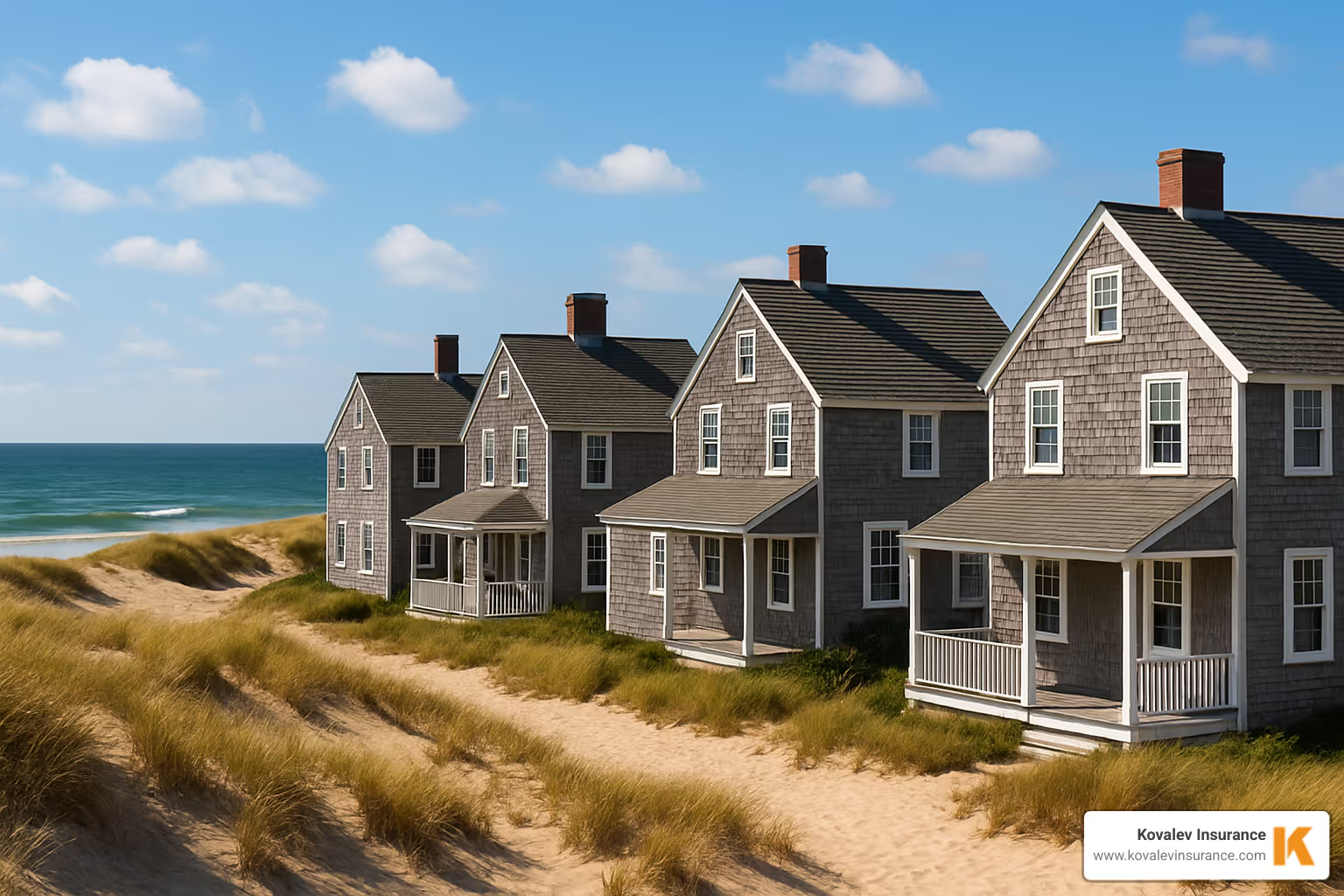
Homeowners insurance Cape Cod MA is specialized coverage that addresses the unique coastal risks of the region while protecting your home and personal belongings. Here's what you need to know:
Cape Cod homeowners face unique insurance challenges that mainland Massachusetts residents don't encounter. The peninsula's exposure to Atlantic storms, coastal flooding, and seasonal occupancy patterns creates distinctive coverage needs and often higher premiums.
Unlike standard Massachusetts policies, homeowners insurance Cape Cod MA must account for hurricane deductibles, flood zone requirements, and the higher rebuilding costs associated with coastal properties. Many Cape homes require specialized endorsements or separate policies to fully protect against common regional threats.
The good news? Local independent agencies understand these nuances and can help steer the complex landscape of coverage options, mandatory requirements, and potential savings opportunities.
With the right policy, you can enjoy peace of mind knowing your Cape Cod home is properly protected against everything from winter nor'easters to summer hurricane threats.
Kovalev Insurance Agency Inc. provides specialized homeowners insurance Cape Cod MA policies custom to the unique needs of coastal property owners. Having grown our agency from 3 to 20 team members while maintaining nearly 300 5-star Google reviews, we understand that Cape properties require expert guidance to ensure proper protection.
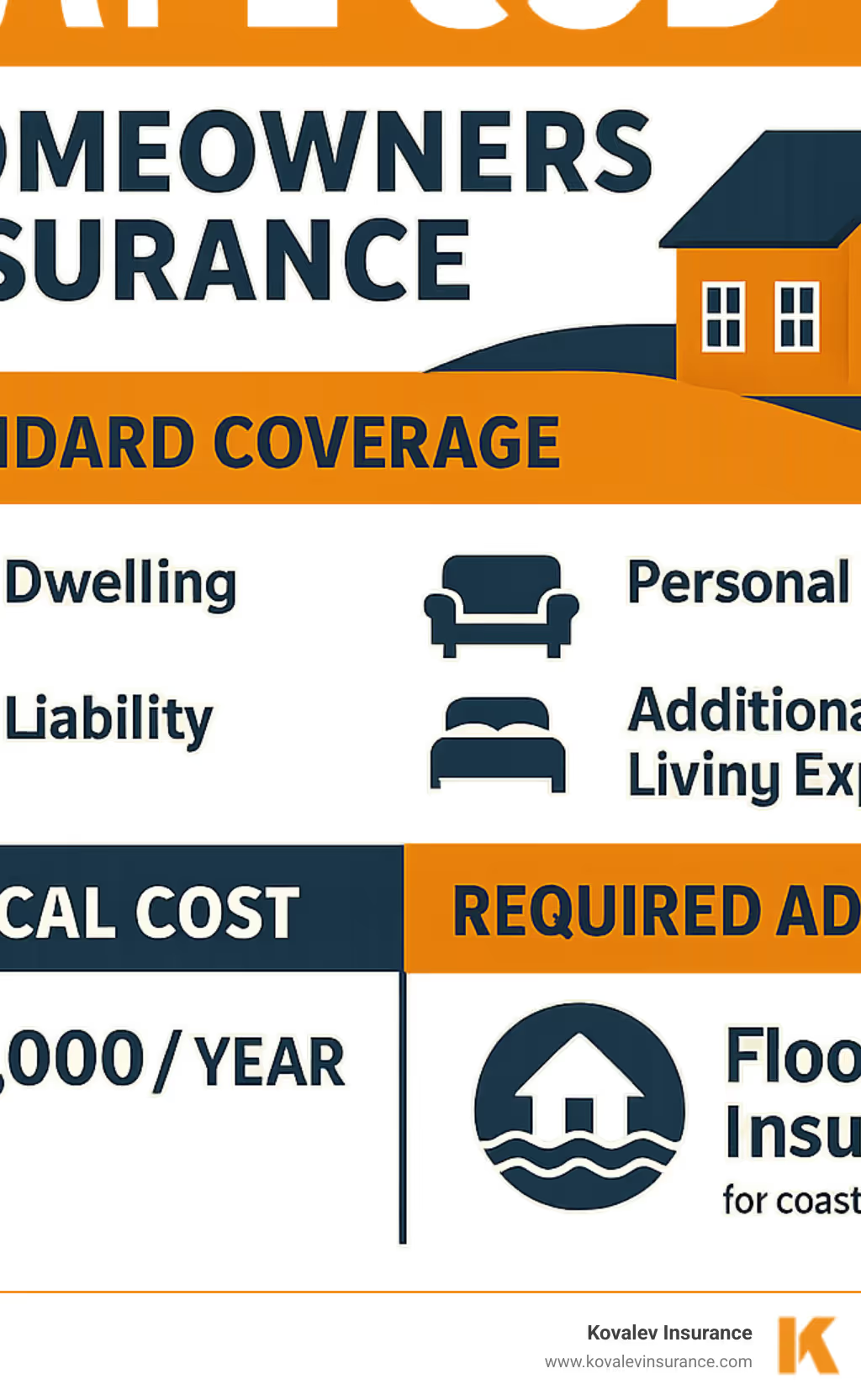
Homeowners insurance cape cod ma terms explained:
Cape Cod's breathtaking shoreline and quaint villages offer an idyllic lifestyle, but they also bring distinctive challenges that make homeowners insurance Cape Cod MA fundamentally different from policies elsewhere in the state. While our clients in Newton, Wellesley, and Brookline certainly face their share of weather events, Cape Cod's direct exposure to Atlantic storms creates a risk profile that demands specialized coverage.

Living on the Cape means embracing nature's beauty—and preparing for its fury. The peninsula's unique geography creates weather vulnerabilities that mainland Massachusetts homes simply don't experience with the same intensity.
When a hurricane barrels up the Atlantic, Cape Cod often stands directly in its path. These storms bring destructive winds exceeding 100 mph that can tear off roofs and topple trees onto homes. Even more concerning is storm surge, where seawater can push far inland, flooding properties well beyond official FEMA flood zones. According to scientific research on flooding, even modest storms can cause devastating water damage when combined with high tides.
The Cape's notorious nor'easters pose another serious threat, particularly during winter months. These powerful storms can linger for days, battering homes with heavy snow, coastal flooding, and relentless winds. For seasonal properties left vacant during winter, the risk of pipe freezes and ice damming becomes particularly acute. As one Wellfleet client finded after a powerful nor'easter, standard policies often don't cover the resulting $25,000 in water damage—a costly lesson that proper homeowners insurance Cape Cod MA could have prevented.
Coastal erosion represents another ongoing concern, as shorelines gradually recede, potentially undermining foundations and altering flood risk profiles. Homes in Natick or Belmont simply don't face this slow-motion threat to their very existence.
Beyond weather threats, Cape Cod's popularity as a vacation destination creates additional risk factors that homeowners in quieter Boston suburbs rarely encounter.
Many Cape homeowners supplement their income by offering short-term rentals during the summer season. While financially rewarding, this practice significantly increases liability exposure. Vacation renters may not treat your property with the same care you would, and the revolving door of guests means more opportunities for something to go wrong.
The high foot traffic in popular vacation areas means more people on and around your property, dramatically increasing the likelihood of injury claims. Those charming features that make your Cape home special—swimming pools, docks, beach access points—all represent potential liability issues when guests are involved.
Seasonal occupancy patterns also make Cape homes vulnerable to theft and vandalism during off-season months when neighborhoods are quieter and less populated. Unlike year-round communities like Brookline or Newton, where neighbors keep watchful eyes on each other's properties, vacation areas can become eerily deserted in winter.
These unique circumstances make standard Massachusetts homeowners policies inadequate for Cape Cod properties. The best homeowners insurance Cape Cod MA policy addresses these specific vulnerabilities, providing the comprehensive protection your coastal property deserves.
We've seen too many homeowners learn these lessons the hard way—after a claim is denied or coverage falls short. With proper planning and expert guidance, your Cape Cod paradise can remain protected against whatever nature and vacation guests might bring your way.
When you own a slice of Cape Cod paradise, understanding what your insurance actually covers can make all the difference when storms roll in from the Atlantic. Most homeowners insurance Cape Cod MA policies come as HO-3 forms, which provide robust "all-risk" coverage for your home's structure while offering more limited "named peril" protection for your personal belongings.
*Note: Many Cape properties have separate, higher deductibles specifically for named storms or hurricanes
When you unwrap a standard HO-3 policy, you'll find six essential coverage types bundled together. Your dwelling coverage protects the actual structure of your home and attached features like that charming front porch. Other structures coverage extends protection to your detached garage, garden shed, or that quaint guest cottage (typically at 10% of your dwelling amount).
Your personal property coverage safeguards everything inside - from furniture to clothing to kitchen appliances - usually at 50-70% of your dwelling amount. If disaster strikes and you can't live in your home, loss of use coverage helps with hotel bills and extra expenses while repairs happen. The personal liability portion protects you if someone gets injured on your property, while medical payments coverage handles smaller guest injuries regardless of who's at fault.
Want to learn more about what Massachusetts home insurance typically covers? Check out our detailed coverage guide.
If you're budgeting for homeowners insurance Cape Cod MA, expect to pay around $2,000 annually - though this figure can swing dramatically based on your specific situation. Those gorgeous oceanfront views in Chatham or Provincetown? They'll cost you about 20-40% more in premiums than a similar home just a few miles inland in Barnstable or Sandwich.
Beyond location, several factors influence your rates. Newer homes built to withstand coastal weather typically enjoy better rates than charming but vulnerable antique properties. Your home's proximity to the nearest fire station matters too - those extra minutes for emergency response in more remote areas translate to higher premiums.
Your personal claims history speaks volumes to insurers. That water damage claim from three years ago? It might still be impacting your rates. Massachusetts insurers can also consider your credit-based insurance score when setting premiums, and choosing higher deductibles generally means lower monthly costs.
Cape properties typically command higher premiums than similar homes in Newton or Brookline. For perspective, a $500,000 home in Wellesley might cost around $1,500 to insure each year, while that same value home with an ocean view in Orleans could easily run $2,500 or more.
Want to see how your rates compare to state averages? Visit our Massachusetts home insurance averages guide.
The good news? There are plenty of ways to trim those Cape Cod insurance costs without sacrificing protection. Bundling policies remains one of the simplest strategies - companies like Safety Insurance offer discounts up to 20% when you combine your home and auto coverage with them.
Many insurers offer substantial credits for newer homes (up to 18% off), loss-free histories (up to 16%), and security systems (up to 16%). Given Cape Cod's weather patterns, wind mitigation improvements like hurricane straps, impact-resistant windows, and reinforced garage doors can lead to meaningful savings.
Smart home technology is another insurance company favorite. Water leak detection systems can prevent catastrophic damage from frozen pipes in those vacant winter months, while connected security systems provide peace of mind when you're back in Natick or Needham during the off-season.
Don't underestimate the power of your credit score - maintaining good credit can significantly lower your premiums. And consider whether a higher deductible makes sense for your situation. Bumping from $500 to $1,000 could save 10-15% on premiums, which adds up over time.
If your Cape home sits empty part of the year, ask about seasonal home discounts. Professional property management or regular caretaker visits can qualify you for reduced rates with many carriers.
One of our clients with a lovely Yarmouth property managed to save nearly $400 annually by bundling policies and installing a monitored security system - investments that essentially paid for themselves within the first year.
Looking for more ways to save? Explore our best home insurance deals guide.
Here's where Cape homeowners need to pay special attention. Standard homeowners insurance Cape Cod MA policies have significant blind spots that can leave you exposed:
Flood damage is perhaps the most critical gap for Cape properties. Whether from hurricane storm surge or nor'easter flooding, water damage from outside sources requires separate flood insurance through the National Flood Insurance Program (NFIP) or private insurers. This isn't optional for most Cape homes - it's essential protection.
Earth movement (including earthquakes, sinkholes, and landslides), sewer backups, and extensive mold remediation all fall outside standard coverage but can be addressed with affordable endorsements. Most policies also severely limit coverage for high-value items like jewelry, art collections, and electronics.
For older Cape homes with character (and outdated systems), ordinance or law coverage becomes crucial. Without it, you could face significant out-of-pocket costs if local building codes require upgrades during repairs after a covered loss.
For comprehensive Cape Cod protection, we typically recommend five key additions:
Flood insurance is essential for virtually all Cape properties, not just those in high-risk zones. The scientific research is clear - flooding risks extend well beyond FEMA flood maps.
Extended replacement cost endorsement provides a 25-50% cushion if rebuilding costs exceed your dwelling limit - particularly valuable given Cape Cod's higher construction costs and potential post-disaster price surges.
Water backup coverage protects against damage from backed-up sewers or drains - a common issue during heavy rains or power outages that affect sump pumps.
Ordinance or law coverage addresses the reality that Cape Cod's charming older homes often require significant code upgrades during repairs.
Personal umbrella policy extends your liability protection beyond standard limits - crucial for properties with rental activity, swimming pools, or waterfront access.
Ice dams represent another Cape Cod winter threat that requires proper coverage. Learn more about ice dam coverage in Massachusetts to ensure you're protected during those frigid months.
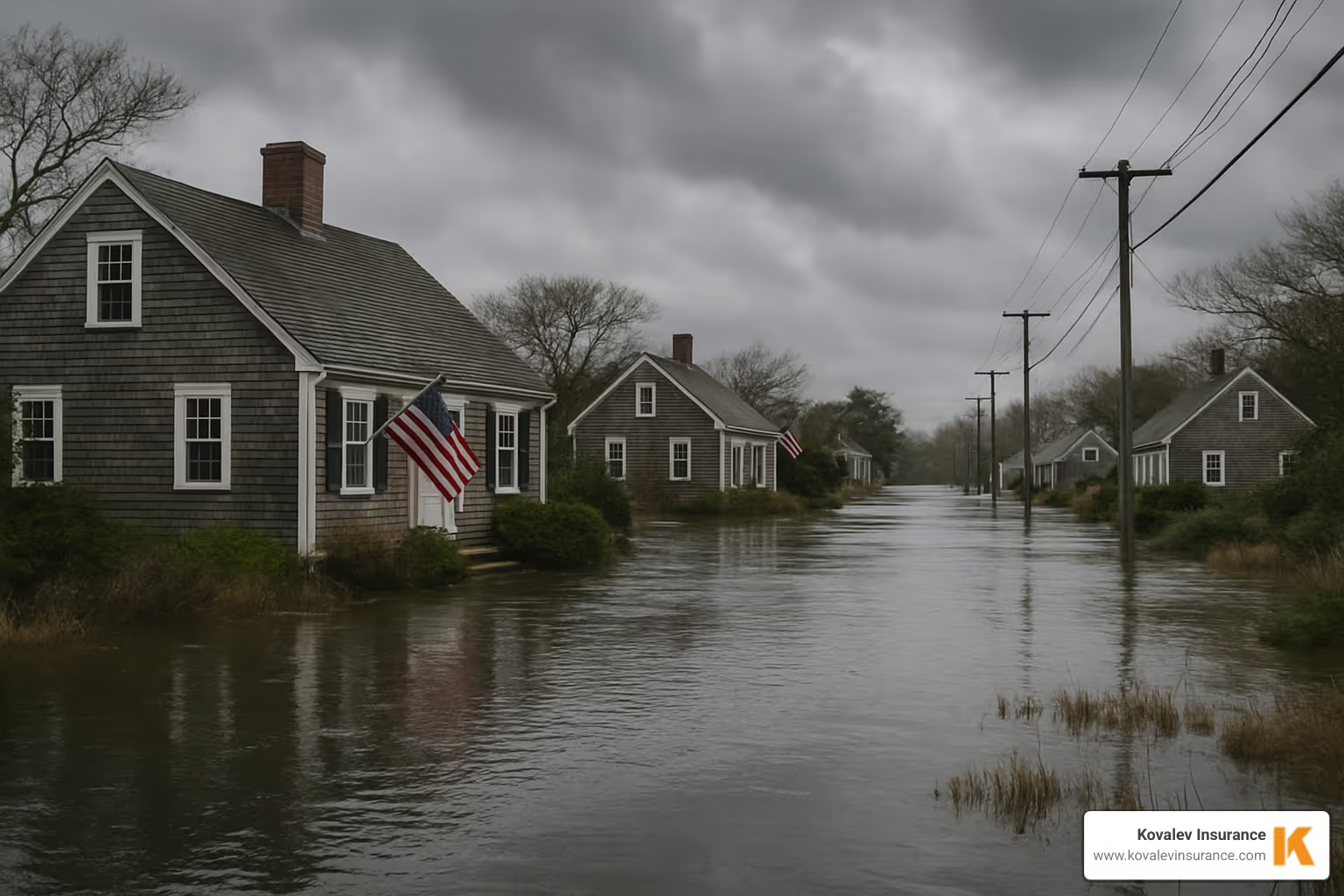
When it comes to protecting your Cape Cod property, there's one sobering fact every homeowner should know: just one inch of floodwater can cause up to $25,000 in damage to an average home. And here's the kicker – your standard homeowners insurance Cape Cod MA policy won't cover a penny of it.
Unlike our clients in Newton or Wellesley, Cape homeowners face a much higher flood risk that requires special attention and specific coverage solutions.
Cape Cod's relationship with water is complicated – it's both the region's greatest asset and its most significant threat. FEMA categorizes the Cape's flood zones into different risk levels, each with specific insurance implications:
Zone V/VE properties sit in high-risk coastal areas where powerful waves (3+ feet) can cause devastating damage during storms. If you've ever witnessed the Atlantic's fury during a nor'easter, you understand why these zones command respect – and mandatory insurance.
Zone A/AE areas face serious flooding risks without the dramatic wave action. These zones often extend surprisingly far inland, catching many homeowners off guard.
Zone X designates moderate to low-risk areas, but don't be fooled – these properties still flood regularly. In fact, over 25% of all flood claims come from "low-risk" zones.
If your Cape property has a federally backed mortgage and sits within Zones V or A, flood insurance isn't optional – it's required. But even if you're mortgage-free or in Zone X, we strongly recommend coverage. I've seen too many Hyannis and Chatham homeowners devastated by flood losses they thought "couldn't happen to them."
When considering flood insurance, remember these critical points:
The 30-day waiting period means you can't wait until a storm is approaching to get covered. Unlike your regular homeowners insurance Cape Cod MA policy, flood coverage doesn't activate immediately.
Grandfathering opportunities exist when FEMA updates flood maps. Securing coverage before new maps take effect can sometimes lock in lower rates – something we regularly help our Brookline and Newton clients do with their Cape vacation properties.
Coverage limits on standard National Flood Insurance Program (NFIP) policies cap at $250,000 for dwellings and $100,000 for contents. For higher-value homes, we can arrange excess flood coverage to bridge the gap.
Elevation certificates might seem like just another piece of paperwork, but they can dramatically reduce your premiums by documenting your home's height relative to potential flood levels.
Cape Cod's identity as a vacation paradise means many properties serve different purposes than primary residences in Natick or Needham. Each situation brings unique insurance considerations:
For second homes, you'll typically need an HO-3 policy with a "secondary home" designation. Expect to pay 15-25% higher premiums than for your primary residence in Belmont or Newton. Insurance companies view these properties as higher risk since they're often vacant for extended periods. Most carriers impose stricter requirements for security systems and winterization, along with more restrictive "vacancy clauses" that could void coverage if the property sits empty too long.
Condominium owners need an HO-6 policy that complements the association's master policy. This provides crucial "walls-in" coverage for your interior fixtures and improvements, which the master policy typically doesn't protect. Don't forget to include loss assessment coverage – I've seen Cape condo owners hit with unexpected $10,000+ special assessments after storm damage to common areas exceeded the association's coverage.
If you're generating income through short-term rentals, standard homeowners insurance Cape Cod MA policies may leave you exposed. Most either exclude or severely limit coverage for rental activities. You might need a dwelling fire (DP-3) policy instead, with specific liability coverage for guest injuries and business income coverage to replace lost rental revenue after a claim.
For our Wellesley and Natick clients with Cape vacation properties, we typically recommend maintaining consistent oversight (either personally or through property management), installing smart home monitoring systems for water leaks and security, securing appropriate seasonal home coverage with vacancy provisions, and considering separate policies for high-value items kept at the vacation property.
Being proactive about protecting your Cape Cod property isn't just smart – it can also save you money on your homeowners insurance Cape Cod MA premiums.
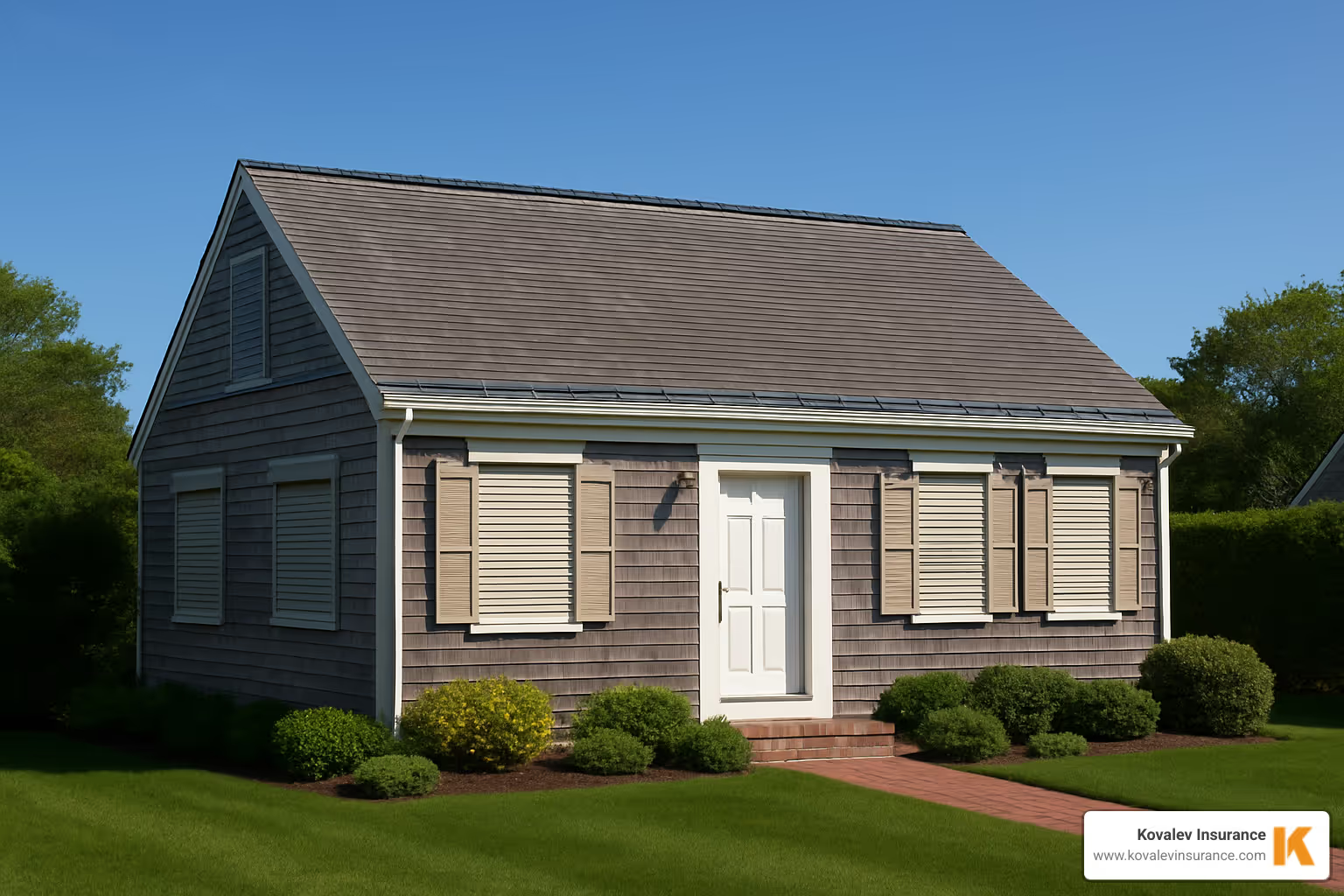
Investing in structural improvements can make your home more resilient to Cape Cod's unique weather challenges. Hurricane straps and clips secure roof-to-wall connections during high winds, while impact-resistant windows or hurricane shutters protect against flying debris. Reinforced garage doors prevent catastrophic structural failures during storms, and liftd utilities in flood-prone areas can save thousands in potential damage.
Regular maintenance practices are equally important. Simple actions like roof inspections, tree trimming, and gutter cleaning can prevent costly damage. For seasonal properties, proper winterization is essential – I've seen pipes burst in vacant Chatham homes, causing over $50,000 in damage that could have been prevented with a $200 smart water shut-off system.
Don't overlook emergency preparations. A backup generator with regular maintenance ensures you'll have power when you need it most. Documenting your home inventory with photos or videos makes the claims process much smoother if disaster strikes. And having a clear evacuation plan could literally save your family's lives during a severe storm.
One of our Hyannis clients invested approximately $7,500 in storm-hardening measures, including hurricane shutters and roof reinforcement. These improvements qualified them for a 12% premium reduction – but more importantly, they potentially saved them from significant damage during a recent coastal storm that severely impacted their neighbors' properties.
Unlike homeowners in Needham or Belmont, Cape Cod residents face unique coastal challenges that require specialized insurance solutions. At Kovalev Insurance, we understand these nuances and can help you steer the complex world of flood insurance, second home coverage, and storm protection. For more insights about Massachusetts insurance costs, visit our blog about MA cost insights.
Getting the right homeowners insurance Cape Cod MA policy doesn't have to be complicated. Whether you're insuring your year-round residence or a summer getaway, the process follows similar steps—with a few coastal considerations thrown in.
When you're ready to protect your Cape Cod property, having the right information at your fingertips makes all the difference. Start by gathering details about your home's construction, age, and safety features. That charming 1920s cottage in Provincetown will have different insurance needs than a modern construction in Hyannis.
Most Cape homeowners are surprised by how quickly we can provide quotes when they come prepared with:
"The biggest mistake I see Cape homeowners make is insuring their home for its market value rather than its replacement cost," explains Mikhail Kovalev. "On Cape Cod, where land values are high but construction costs are even higher, this can leave you seriously underprotected."
Before binding coverage, carefully review the policy details—paying special attention to hurricane deductibles, which are typically higher than standard deductibles and applied specifically to named storms. While our Newton and Wellesley clients rarely worry about hurricane deductibles, they're a crucial consideration for Cape properties.
Our online quote form is designed to capture all the essential information about your Cape home, allowing us to return personalized homeowners insurance Cape Cod MA options usually within one business day—perfect for busy professionals who split their time between Boston suburbs and Cape getaways.
Your insurance needs change over time, especially for coastal properties where risks evolve with each passing season. We recommend setting a calendar reminder for an annual policy review, ideally about 60 days before renewal.
During this check-up, we'll help you:
Update your home's replacement value to reflect the current construction market. Cape Cod rebuilding costs have skyrocketed in recent years, with some areas seeing 30% increases since 2020.
Document recent improvements like that new kitchen renovation or roof replacement. That $50,000 you invested in your Chatham property's outdoor living space needs to be reflected in your coverage.
Review personal property coverage for any new high-value purchases. Did you finally buy that artwork for your Cape house? Standard policy limits for valuables may not be enough.
For our clients who maintain homes in both Newton or Natick and on the Cape, we coordinate these reviews to ensure consistent protection across all properties. Many of our Brookline and Wellesley clients appreciate how we track both their primary and vacation homes in one system, making recommendations that consider their complete property portfolio.
When the weather turns fierce on Cape Cod—as it inevitably does—knowing how to steer the claims process becomes invaluable.
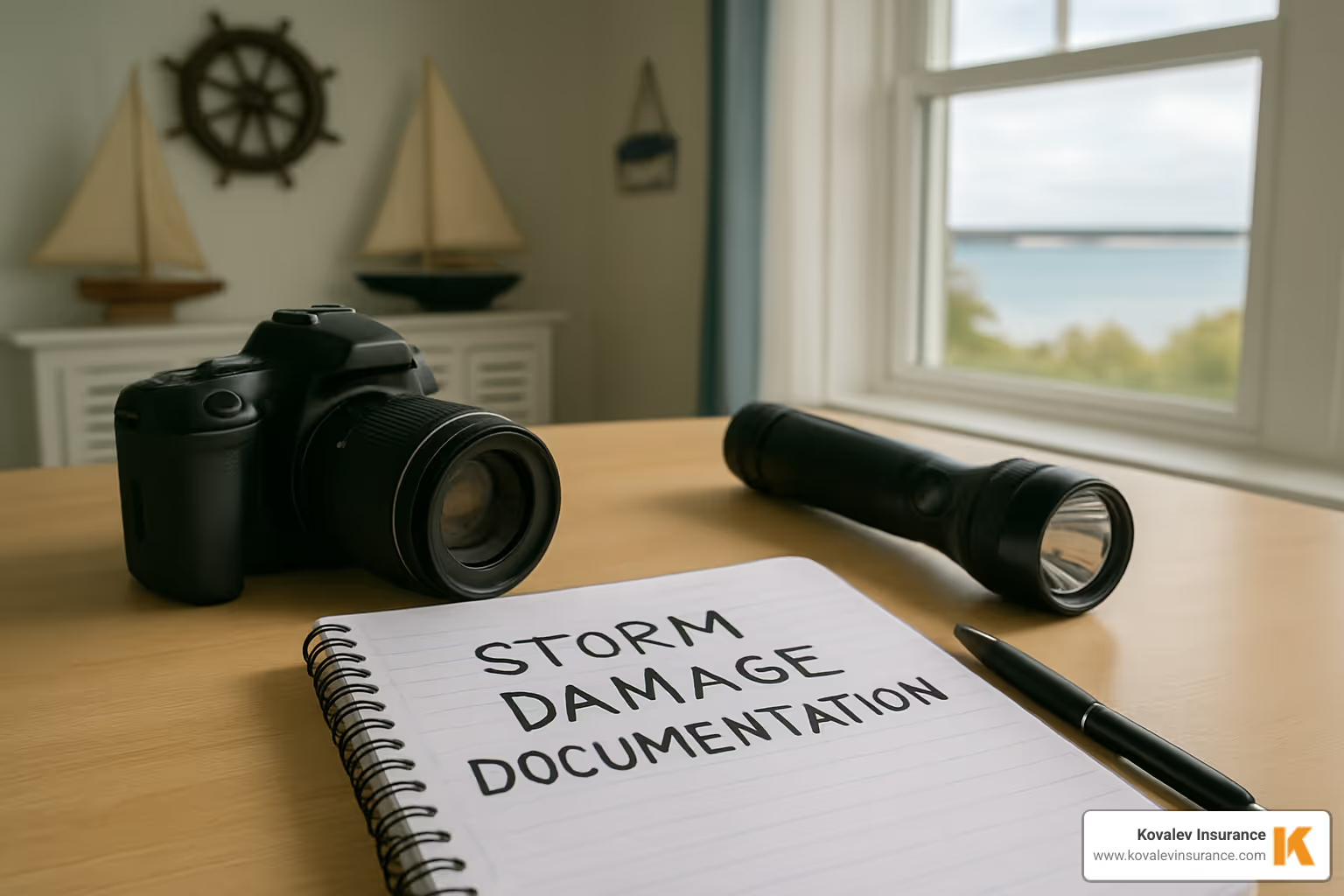
First things first: safety comes before paperwork. Once everyone's safe, document everything with photos and videos before making temporary repairs. This visual evidence becomes crucial when working with adjusters.
For Cape properties, one of the trickiest aspects is determining whether damage came from wind (covered under standard homeowners insurance Cape Cod MA) or flooding (requiring separate flood coverage). I've seen many claims where this distinction becomes the difference between full coverage and no coverage at all.
"After a recent nor'easter, one of our Belmont clients with a Wellfleet vacation home was initially denied coverage because the insurer claimed flood damage," shares Kovalev. "Our documentation showing wind-driven rain entering through damaged roof vents—not rising water—ultimately secured full coverage for interior damages."
For second homeowners who can't be on-site immediately after a storm, we offer claim advocacy services. While our Newton and Needham clients are handling their busy professional lives, we coordinate with adjusters, contractors, and property managers to ensure their Cape homes receive prompt attention.
Remember to save all receipts for emergency repairs and additional living expenses if your home becomes uninhabitable. Most homeowners insurance Cape Cod MA policies include loss of use coverage, but you'll need documentation to receive reimbursement.
The claims process typically takes 2-3 weeks for straightforward cases, though complex Cape Cod claims involving structural damage or disputes about causation may take longer. Throughout this process, we stand by our clients, translating insurance jargon and ensuring fair treatment.
For more detailed information about the claims process, visit our comprehensive guide on how to buy home insurance in Massachusetts.
Navigating the complexities of homeowners insurance Cape Cod MA brings up many questions from our clients. Here are the answers to the most common concerns we hear from homeowners across Newton, Wellesley, and other Massachusetts communities with Cape properties.
Absolutely. This is perhaps the most dangerous misconception about Cape Cod properties. Many homeowners are surprised to learn that flooding affects properties far beyond the immediate coastline. Storm surge can push water significantly inland, while heavy rainfall and rising groundwater don't discriminate based on ocean proximity.
The statistics tell the story: according to FEMA, more than 20% of all flood insurance claims come from properties in "low-risk" zones. When you consider that just one inch of floodwater can cause up to $25,000 in damage to an average home, flood insurance becomes one of the wisest investments for virtually any Cape Cod property owner.
One of our Natick clients with a property in South Yarmouth initially questioned the need for flood coverage since their Cape home sat nearly a mile from the water. After a particularly severe nor'easter sent water into their finished basement, they were grateful they'd heeded our advice to secure a flood policy.
Timing matters tremendously with Cape Cod insurance. Standard homeowners insurance Cape Cod MA policies typically become effective immediately or on a specific future date of your choosing. You can often bind coverage the same day you apply.
Flood insurance is a completely different story. Most flood policies come with a 30-day waiting period before coverage begins. The few exceptions include when the policy is required for a mortgage closing or if there's a map change affecting your property.
This waiting period explains why we see a flood of panicked calls whenever a hurricane forms in the Atlantic—unfortunately, by then, it's too late to secure coverage for that specific storm. For our Brookline and Newton clients with Cape properties, we always emphasize securing flood coverage well before the hurricane season begins.
This distinction catches many Cape homeowners by surprise when filing their first storm claim. Most homeowners insurance Cape Cod MA policies contain special, higher deductibles specifically for named storms or hurricanes.
While your standard wind damage deductible might be a straightforward $1,000 or $2,500, hurricane deductibles typically work as a percentage of your dwelling coverage—usually ranging from 1% to 5%. For a home insured for $500,000, this translates to an out-of-pocket expense between $5,000 and $25,000 before insurance kicks in.
Understanding this difference is crucial for financial planning. We've seen Wellesley residents with Cape vacation homes be caught off-guard by these higher deductibles during major storms. We recommend setting aside funds specifically to cover your hurricane deductible as part of your emergency planning.
No—and attempting to do so could lead to denied claims when you need coverage most. If you're renting your Cape property, whether for short-term vacations or long-term tenancy, you need specialized coverage custom to rental activities.
For short-term vacation rentals, you'll typically need either specific endorsements to a homeowners policy or a dedicated dwelling fire policy with appropriate liability protection. Many of our Needham and Belmont clients who rent their Cape properties through platforms like Airbnb or VRBO don't realize their standard policies exclude these activities.
Long-term rentals require a landlord policy (often called a dwelling fire or DP-3 policy). These policies are specifically designed to cover the unique risks associated with tenant-occupied properties, including extended vacancy periods between tenants.
Most standard homeowners insurance Cape Cod MA policies do cover interior water damage resulting from ice dams, but prevention remains crucial. Cape Cod's winter climate creates perfect conditions for ice dam formation, particularly in areas exposed to coastal moisture and temperature fluctuations.
For seasonal properties left vacant during winter months, the risk is even greater. Many of our Newton and Natick clients maintain minimum heat settings and arrange for regular property checks during the off-season. Proper insulation, ventilation, and gutter maintenance also help prevent these issues.
One client with a Wellfleet property learned this lesson the hard way when an undetected ice dam caused over $30,000 in interior damage during a particularly cold February. While insurance covered the claim, the inconvenience and temporary loss of use could have been avoided with preventative measures.
This question is particularly relevant for Cape Cod properties, where construction costs run significantly higher than many other parts of Massachusetts. These costs have increased dramatically in recent years, leaving many homeowners dangerously underinsured.
The most common mistake we see is basing coverage on purchase price or market value rather than actual rebuilding costs. For historic homes in places like Chatham or Provincetown, or custom-built properties throughout the Cape, the gap between market value and replacement cost can be substantial.
We recommend having a professional replacement cost estimate performed every few years, especially after renovations or significant market changes. For many of our clients with unique or historic Cape properties, guaranteed replacement cost coverage offers valuable peace of mind despite the additional premium.
For personalized answers to your Cape Cod insurance questions, contact us for a comprehensive insurance checkup or request a personalized home insurance quote custom to your specific Cape Cod property needs.
Navigating the waters of homeowners insurance Cape Cod MA isn't always smooth sailing, but having the right coverage makes all the difference between weathering the storm and being left adrift. The Cape's stunning coastline and charming communities come with unique insurance challenges that require specialized knowledge and custom solutions.
Think of your Cape Cod insurance policy as your property's lifejacket – it needs to fit perfectly and be ready when you need it most. From hurricane deductibles to flood zone requirements, the details matter tremendously when protecting your coastal investment.
For our clients who split their time between homes in Newton or Wellesley and their Cape retreats, we understand the importance of seamless protection across all properties. The peace of mind that comes from knowing both your primary residence and your beach getaway are properly covered allows you to truly enjoy Massachusetts living at its finest.
Even if you're a year-round Cape resident, the seasonal shifts in weather risks – from summer hurricanes to winter nor'easters – demand insurance solutions that adapt to your changing needs. We've helped countless homeowners from Provincetown to Falmouth secure that protection without breaking the bank.
At Kovalev Insurance, we bring our expertise serving communities throughout Massachusetts to bear on the unique challenges of Cape Cod properties. Our team doesn't just understand insurance – we understand the specific nuances of coastal living and the coverage it requires. We're committed to finding you the right balance of comprehensive protection and affordability, whether you're in Brookline, Needham, Natick, or anywhere on the Cape.
Ready to sleep better knowing your Cape Cod home is properly protected? Contact our local independent insurance agency today for a personalized quote and consultation. Let's make sure your coastal paradise stays protected, come sunshine or storm surge.
X